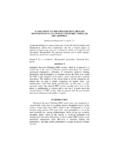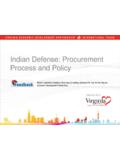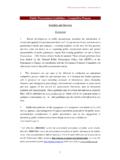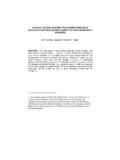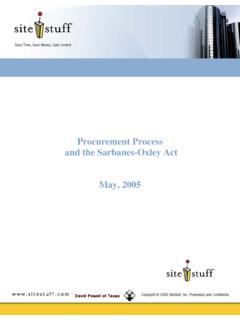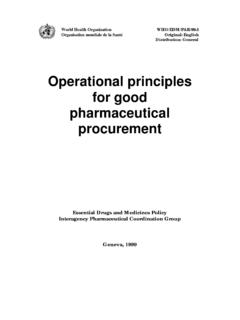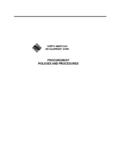Transcription of CORRUPTION IN THE PROCUREMENT PROCESS
1 CORRUPTION IN THE PROCUREMENT PROCESS /OUTSOURCING GOVERNMENT FUNCTIONS: ISSUES, CASE STUDIES, IMPLICATIONS PROF. NIKOS PASSAS [Shortened version prepared by W. Black] REPORT TO INSTITUTE FOR FRAUD PREVENTION NORTHEASTERN UNIVERSITY, BOSTON FEBRUARY 2007 2 EXECUTIVE SUMMARY This report presents a case study into PROCUREMENT fraud and CORRUPTION in connection with ongoing programs in Iraq. The effort involves unprecedented reliance on private contractors to provide services and goods in a combat environment. The methods employed for this study combined interviews, site visits, collection and analysis of court documents, review of the literature and secondary data.
2 The report covers six primary topics. First, it shows why PROCUREMENT for Iraq inherently took place in a criminogenic environment. Second, it explains how elite criminals act dynamically to take advantage of such environments and to change such environments to optimize them for crime. Third, it notes why effective controls are essential to limit PROCUREMENT abuses. Fourth, it demonstrates that inadequate controls and other practices have made the environment even more criminogenic. Fifth, it summarizes why the PROCUREMENT abuses have harmed national security. Sixth, it suggests policy reforms to reduce the abuses. PROCUREMENT effort in Iraq is taking place in a strongly criminogenic environment.
3 Transparency International (TI) notes that PROCUREMENT is the leading environment in which grand (v. petty ) CORRUPTION takes place. TI notes three PROCUREMENT fields that account for the bulk of grand corrupt transactions: military, construction, and oil. The effort to reconstruct and pacify Iraq required success in each of these three inherently risky PROCUREMENT fields. In such circumstances, it is essential to have in place the best possible controls to reduce fraud and CORRUPTION . This report emphasizes what criminology teaches about fraud and CORRUPTION by elites that have substantial governmental power or economic power (typically as CEOs).
4 Often, of course, they have both forms of power simultaneously. Elite criminals (what Black refers to as control frauds ) have far greater ability than non-elites to act dynamically to optimize the environment for fraud while neutralizing their crimes psychologically and obtaining substantial impunity. The first level of dynamism is that elites are able to choose to operate wherever the legal, political, economic and cultural environment is most criminogenic and the payoffs to abuse the greatest. The second level is that elites are able to change the environment to increase the asymmetries and make it far more criminogenic.
5 Normally, thieves face a fairly symmetrical environment: to steal more they have to take greater risks of detection, prosecution and sanction. But elites can often produce an environment in which engaging in massive fraud and CORRUPTION increases one s political power and status and greatly reduces the risks of detection and prosecution. Elite criminals optimize by creating fraud networks that help them maximize this asymmetry of risk and reward. Criminologists have long argued that, in addition to its economic and political injury, fraud and CORRUPTION kill. In Iraq, the success of the PROCUREMENT effort was vital to the twin missions to pacify and reconstruct the country.
6 Independent experts agree that the failures of the PROCUREMENT effort have made the already horrendously difficult missions impossible. Indeed, Iraq may now be the most corrupt nation in the world. (TI s CORRUPTION Perception Index (CPI) for 2006 ranks only one nation Haiti as more corrupt than Iraq.) The CORRUPTION is believed to be a major source of funding of the insurgents. The CPI ranking has worsened since 2001 from (tied for 16th place) to (20th best) in 2006. The Global CORRUPTION Barometer 2006 for the has also fallen. Americans surveyed by TI hold the view that anti- CORRUPTION efforts are ineffective. 3 The report concludes with policy recommendations regarding the PROCUREMENT PROCESS , revolving door practices, conflicts of interest and improved prevention, enhanced legitimacy, transparency and support of public trust.
7 The general policy implications from this study point to the following measures: Clarify the goals of PROCUREMENT and PROCUREMENT /ethics rules Balance priorities and values in view of available capacity and resources Simplify and streamline the PROCUREMENT system Conduct a systematic and credible study into the extent of the use of contractors, the concrete problems posed by cohabitation and ways in which these can be minimized Create a central database of information Develop a normative framework through multi-stakeholder communications Ensure consistency of conflict of interest and other rules applying to government employees and private contractors Ensure oversight.
8 Transparency and openness strengthen the capacity of the Office of Government Ethics to oversee private contractors Ensure that there is a fair and competitive bidding PROCESS Render the third party workforce visible to the public Sanction misconduct and improve accountability Encourage and reward integrity and mutual respect Raise awareness and renew public trust Provide for regular training and proper management of contractors 4 Introduction and background PROCUREMENT is an area that has long been recognized as being particularly vulnerable to fraud and CORRUPTION . This is true in the private sector, where the typical problem is kickbacks to the contract officer.
9 It is also true in public sector PROCUREMENT where the fraud can be initiated by either the public contracting official or the private supplier. The World Bank has estimated that roughly $ trillion in public contract awards are influenced by CORRUPTION . PROCUREMENT fraud is often associated with cartels. In Japan, for example, the dango has rigged the bids on public construction projects for many decades. The PROCESS is illegal but is carried on with impunity. PROCUREMENT fraud is a serious concern in advanced and developing nations. PROCUREMENT in the context of the occupation of Iraq, therefore, would have posed a strong, inherent risk of fraud and CORRUPTION in the best of circumstances.
10 The circumstances, however, were far from the best. Iraq was a dictatorship run by Saddam Hussein through the Baath party. The key leaders were disproportionately members of a religious minority in Iraq (Sunnis) from a particular region (Tikrit). The government, therefore, had little legitimacy and few credible institutions. The law enforcement personnel were repressive and had no popular support. Gulf War I led to enormous destruction of Iraqi infrastructure, particularly communications, electrical generation and transportation. Hussein s unwillingness to comply with peace provisions after the first Gulf War led to a sanction regime that caused Iraq s infrastructure to deteriorate further and its economy to stagnate.
